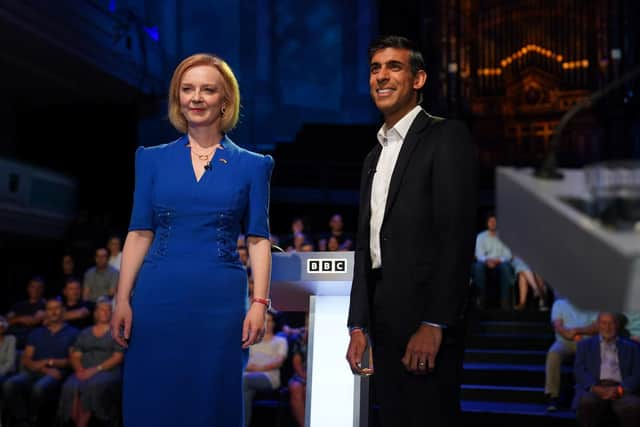The Conservative leadership race has left the majority of us looking on as mere spectators - David Blunkett
But now I know how other people feel when they’re viewing what’s going on from outside. Because the Conservative leadership campaign, which will eventually end in a new Prime Minister, is, for all but a tiny handful, a spectator sport.
In the last four weeks we have, at each phase, been presented with what can only be described as deeply depressing banality.
Advertisement
Hide AdAdvertisement
Hide AdIt started back in July, with absurd promises of tax cuts, including by the interim Chancellor of the Exchequer, Nadhim Zahawi, followed by the most irresponsible suggestions of 20 per cent cuts in departmental budgets.


To you and me, that is a massive cut in our services and transfer from publicly provided necessities, to tax fuelled acceleration of the already eye-watering inflation we are experiencing, and as a consequence, a further, and probably substantial, hike in interest rates and other measures to depress the very inflationary consequences generated by the tax cuts in the first place.
So here is the truth as I see it. The Conservative Party membership, because of their age, their income, and where they live, not only benefit most from tax cuts, but are least hurt by interest rate rises to compensate. In fact, many of them would benefit.
Liz Truss, in particular, appears to have disavowed her time as a senior cabinet member in a Conservative Government and developed a quite separate manifesto.
Advertisement
Hide AdAdvertisement
Hide AdA manifesto that the rest of us have never voted for and therefore has no political legitimacy, a fact seemingly ignored by many political pundits.
Don’t take my word for the impact of ill-thought through tax cuts.
Just look back to what happened with Anthony Barber’s disastrous 1972 budget and Nigel Lawson’s budget in 1988 when even my guide dog, Teddy, was sick, and I mean literally sick, during the budget speech.
Economic illiteracy in leaders of our country is, of course, nothing new. Sir Alec Douglas-Home, who was briefly Prime Minister when Harold Macmillan stood down, openly admitted that he did his economic calculations using matchsticks. Even so, Labour, under Harold Wilson, only won the October 1964 election by four seats.
Advertisement
Hide AdAdvertisement
Hide AdThe leadership race has seen candidates knocking bells out of each other, but in my view, in the immediate future, two dangers arise for our democratic dialogue.
The first is that the only show in town is to hear about what passes for the ideas and values of the political right.
Day after day, column inch after column inch, our radio, television and social media are filled with a right-wing agenda.
It is not only the Labour Party and alternatives to the current mess that get squeezed out, but attention on fundamental issues that face us now, and will certainly face us in years to come.
Advertisement
Hide AdAdvertisement
Hide AdWhat’s wrong with the country has much to do with what’s happened over the last 12 years.
It is, after all, just one year short of the Blair-Brown administrations from 1997 to 2010.
Instead of the process of political debate, at least on the right of British politics - enhancing the standing of politicians and trust in their competence and vision to see the country through – we have a deeply unedifying pretence that it had nothing to do with them.
Tom Tugendhat, who was eliminated before the final ballot, was the only candidate who was not, in one way or another, smeared with the failure of three Conservative Prime Ministers.
Advertisement
Hide AdAdvertisement
Hide AdOnly once this jamboree is over and the Party Conference season starts in earnest, there will just be a chance to break the current hegemony in the political dialogue.
Perhaps we could return to talking about the crisis for millions of people in meeting their household bills, and some of the other continuing, and massive, issues for the future.
During July’s heatwave, it was pretty galling to learn that some Conservatives feel that they could win support by scepticism about global warming.
The challenges of the future – which include an ageing population, a transformation in the world of work, and the rights and protections of consumers – should all be at the top of the agenda.
Advertisement
Hide AdAdvertisement
Hide AdFor me, unsurprisingly, one of the key issues – both for the well-being of individuals and for a successful economy in an ever more difficult global landscape, is education.
Not just “skills”, but lifelong learning.
The combination of learning to do something well, whether it’s as a plumber or electrician or, for that matter, as a politician or professional journalist, is essential.
Adaptability, transferability and, above all, progression through life, surely has to be an aspiration that someone, somewhere might take seriously.
But don’t hold your breath. Spending on adult skills has been cut by a third, and spending on children in schools will reach, in two years’ time, the amount, in real terms, that schools were receiving back in 2010.
Frankly, I’m beginning to think we live in a madhouse.
Advertisement
Hide AdAdvertisement
Hide AdOne small consolation for those of us in Yorkshire, is that one candidate represents a seat in the Historic County, and the other can claim to have been brought up in Leeds.
Small consolation for those yearning for a leader of stature, of integrity and of vision.